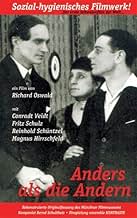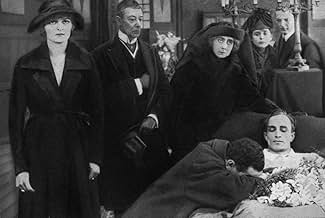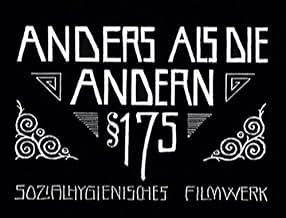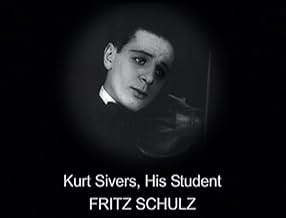IMDb RATING
7.0/10
1.7K
YOUR RATING
Two male musicians fall in love, but blackmail and scandal makes the affair take a tragic turn.Two male musicians fall in love, but blackmail and scandal makes the affair take a tragic turn.Two male musicians fall in love, but blackmail and scandal makes the affair take a tragic turn.
- Director
- Writers
- Stars
- Director
- Writers
- All cast & crew
- Production, box office & more at IMDbPro
Featured reviews
Interesting early film dealing with homosexuality and the laws in Germany at the time making it a crime punishable by a prison sentence. About a famous violin virtuoso, Paul (played by Conrad Veidt), who after a concert one evening is approached by a handsome young man named Kurt who idolizes and has a youthful crush on the older man. Kurt dreams of taking lessons from his idol, so visits the kimono-dressed man in his apartments where he is soon being given private violin lessons. The two men quickly become closer and closer, playing duets together on violin and piano, and taking strolls in the park arm and arm, but unfortunately a blackmailer sees them in the park - and seizes upon an opportunity to make himself some quick "hush money". Interestingly, the blackmailer himself hangs out in a nightclub full of women dressed as men, and pairs of men dancing together, which made me wonder - is he out to find himself another victim for blackmail here or is he himself?
This film is a reconstruction containing fragments, strung together in a well-done manner with intertitles and still photos describing and portraying the missing scenes. The print for the scenes that are intact look quite nice here, the music is appropriate and pleasing. Parts of the film almost come across as instructional, including a lecture given by a sexologist featuring a slide show of males and females mostly in various states of cross-dress. Conrad Veidt gives a very well-done, touching performance here, really giving off a keen sense of the strong relationship and love felt between Paul and Kurt. Well worth seeing.
This film is a reconstruction containing fragments, strung together in a well-done manner with intertitles and still photos describing and portraying the missing scenes. The print for the scenes that are intact look quite nice here, the music is appropriate and pleasing. Parts of the film almost come across as instructional, including a lecture given by a sexologist featuring a slide show of males and females mostly in various states of cross-dress. Conrad Veidt gives a very well-done, touching performance here, really giving off a keen sense of the strong relationship and love felt between Paul and Kurt. Well worth seeing.
This film deals with a prosperous man who encounters a sleazy blackmailer who discovers that he is gay. (This silent rarity is a good reason for film preservation!)
A much later film "Victim", deals with a similar subject.
A much later film "Victim", deals with a similar subject.
"Anders als die Andern" (Different from the Others) is a 1919 German film starring Conrad Veidt that was pieced together and shown at one point on public television.
About a law on the books that makes homosexuality a crime, it had a very short run in Germany before being pulled, and people who attended the movie were harassed.
The lead is played by a German actor familiar to American audiences, usually for portraying a bad guy, Conrad Veidt. Despite dying in 1943, Veidt had a nearly 30-year career in films. Here he plays possibly the first gay character in cinema who, with such a law in place, is a target for a blackmailer.
A very interesting film with a wonderful performance by Veidt. Only part of the movie remains, but it has been put together as well as can be expected - it is, after all, a mere 102 years old. It's amazing how relevant some of the material in it remains today.
About a law on the books that makes homosexuality a crime, it had a very short run in Germany before being pulled, and people who attended the movie were harassed.
The lead is played by a German actor familiar to American audiences, usually for portraying a bad guy, Conrad Veidt. Despite dying in 1943, Veidt had a nearly 30-year career in films. Here he plays possibly the first gay character in cinema who, with such a law in place, is a target for a blackmailer.
A very interesting film with a wonderful performance by Veidt. Only part of the movie remains, but it has been put together as well as can be expected - it is, after all, a mere 102 years old. It's amazing how relevant some of the material in it remains today.
It's a wonder any of this film exists; if not for the wear of age (it's said that most films of this era are lost), one would think censorship and the Nazis would have annihilated it. Yet, much of the footage remains. The Kino release of the reconstruction fills in the rest of the story with explanatory intertitles and still photographs, nearing the film's original runtime. That's the first wonder.
The second is its message of tolerance and understanding of homosexuals. Message films, social realist films, or "enlightenment films" were not too common in the silent era, probably because the lack of sound takes away from the capacity to lecture. Lois Weber is an exception that I'm familiar with; she made a career out of selling morals to audiences. "Different from the Others" includes the tact of a self-referential scene, which Weber broadened to more interesting depths in her best work. This is a film pleading for the equality of homosexuals, and it features a lecture within the lecture doing the same: the "sexoligist" Magnus Hirschfeld giving a slideshow presentation, which is attended by Else. I think it makes the film more honest, and, at the same time, it's a way for the filmmakers to be as blunt as possible.
It's difficult to appreciate the film aesthetically, anymore. The gay nightclub scenes are frank, but the film seems to shy away from too much intimacy between homosexuals. "Philadelphia" (1993) has been criticized for it's lack of a kiss, too, so I suppose it's asking too much of a film from 1919. The camera-work appears rather static, as well. On the other hand, Conrad Veidt was an admirable man and quite an actor. This is as much bravery from a prominent actor as you'll ever see. And, he was outspoken against the Nazis, as opposed to Emil Jannings, probably the other major male star of German silent film. Although Veidt's performance is much in the style of the time, he shows the right balance of effeminacy without being stereotypical.
Other than Veidt, the film isn't of much entertainment or artistic value. The film's message, however, is very important, even today; as the reconstruction introduction says, Germany, while a generally liberal government and populace today, Paragraph 175 wasn't repealed until 1994. And, there's the marriage debate in the US and elsewhere. "Different from the Others" is powerful in that way.
The second is its message of tolerance and understanding of homosexuals. Message films, social realist films, or "enlightenment films" were not too common in the silent era, probably because the lack of sound takes away from the capacity to lecture. Lois Weber is an exception that I'm familiar with; she made a career out of selling morals to audiences. "Different from the Others" includes the tact of a self-referential scene, which Weber broadened to more interesting depths in her best work. This is a film pleading for the equality of homosexuals, and it features a lecture within the lecture doing the same: the "sexoligist" Magnus Hirschfeld giving a slideshow presentation, which is attended by Else. I think it makes the film more honest, and, at the same time, it's a way for the filmmakers to be as blunt as possible.
It's difficult to appreciate the film aesthetically, anymore. The gay nightclub scenes are frank, but the film seems to shy away from too much intimacy between homosexuals. "Philadelphia" (1993) has been criticized for it's lack of a kiss, too, so I suppose it's asking too much of a film from 1919. The camera-work appears rather static, as well. On the other hand, Conrad Veidt was an admirable man and quite an actor. This is as much bravery from a prominent actor as you'll ever see. And, he was outspoken against the Nazis, as opposed to Emil Jannings, probably the other major male star of German silent film. Although Veidt's performance is much in the style of the time, he shows the right balance of effeminacy without being stereotypical.
Other than Veidt, the film isn't of much entertainment or artistic value. The film's message, however, is very important, even today; as the reconstruction introduction says, Germany, while a generally liberal government and populace today, Paragraph 175 wasn't repealed until 1994. And, there's the marriage debate in the US and elsewhere. "Different from the Others" is powerful in that way.
Two male musicians fall in love, but blackmail and scandal makes the affair take a tragic turn.
Director Richard Oswald was bold in making this film and pushing the message that homosexuality was not a crime but a failure of society to be accepting. Especially at the time when homosexuality was blatantly illegal in Germany. Not surprisingly, the film was soon banned and almost completely destroyed.
Conrad Veidt was also bold for starring in it, even if he had not yet been made into a star for "Cabinet of Dr. Caligari" the following year. This was at least Veidt's second time working with Oswald, having just finished up "Uncanny Stories".
The plot is interesting in making the presentation that homosexuality is normal (definitely a minority view at the time) and the real crime was extortion from those who would blackmail closeted men. Although neither Oswald nor Veidt were gay, they clearly had sympathy for their brethren (Veidt was later better known for standing up for the Jewish community).
Director Richard Oswald was bold in making this film and pushing the message that homosexuality was not a crime but a failure of society to be accepting. Especially at the time when homosexuality was blatantly illegal in Germany. Not surprisingly, the film was soon banned and almost completely destroyed.
Conrad Veidt was also bold for starring in it, even if he had not yet been made into a star for "Cabinet of Dr. Caligari" the following year. This was at least Veidt's second time working with Oswald, having just finished up "Uncanny Stories".
The plot is interesting in making the presentation that homosexuality is normal (definitely a minority view at the time) and the real crime was extortion from those who would blackmail closeted men. Although neither Oswald nor Veidt were gay, they clearly had sympathy for their brethren (Veidt was later better known for standing up for the Jewish community).
Did you know
- TriviaMagnus Hirschfeld, a prominent sexologist, co-wrote the screenplay and made a cameo appearance as The Doctor, with whom Paul Korner consults. A scene resembling that of the modern-day LGBT scene existed in Weimar Germany, albeit underground, and the scene at the gay bar featured actual LGBT individuals. The screenwriter and author Anita Loos said of this period, in 1923: "Any Berlin lady of the night might turn out to be a man: the prettiest girl on the street was Conrad Veidt, who later became an international film star." (It was Hirschfeld who coined the term 'transvestism.')
- Alternate versionsThere is an Italian edition of this film on DVD, distributed by DNA srl, "DIVERSI DAGLI ALTRI: Alle Origini Del Cinema Gay - Special Edition" (4 Films on a single DVD: Mikaël, 1924 + Fireworks, 1947 + Un chant d'amour, 1950 + Anders als die Andern, 1919), re-edited with the contribution of film historian Riccardo Cusin. This version is also available for streaming on some platforms.
- ConnectionsEdited into Gesetze der Liebe (1927)
- How long is Different from the Others?Powered by Alexa
Details
- Release date
- Country of origin
- Languages
- Also known as
- Не такий як всі
- Filming locations
- Berlin, Germany(unknown scenes)
- Production companies
- See more company credits at IMDbPro
- Runtime
- 50m
- Color
- Sound mix
- Aspect ratio
- 1.33 : 1
Contribute to this page
Suggest an edit or add missing content































